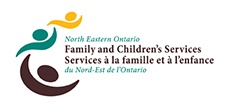Services Data Highlights - Year in Review
Service Data is for the 2023-2024 Fiscal Year unless otherwise noted.
Prevention Services
Brighter Future
- Children Served: 280
- Visits by Children: 4,334
- Parents/Caregivers Served: 307
- Visits by Parents/Caregivers: 3,578
- Total Hours of Service Provided: 1,509.8
- Participants in Workshops: 20
- Total Hours of Workshops: 10.5
EarlyON Child and Family Centres (Timmins, Kapuskasing & Smooth Rock Falls)
- Children Served: 439
- Visits by Children: 2,830
- Parents/Caregivers Served: 407
- Visits by Parents/Caregivers: 2,410
Volunteer Services
Service data for the 2023 calendar year.
- Active volunteers: 11
- Total of kilometres driven: 44,820 KM
- Volunteer hours: 758.12
Youth Justice
Indicator & Number of Clients Served
- Non-Residential Attendance Centres: 77
- 1,116.29 Hours of Direct Service
- Restorative Justice: 30
- 115.69 Hours of Direct Service
- Anger Management Program: 21
- 270.99 Hours of Direct Service
- Community Support Team: 47
- 593.1 Hours of Direct Service
- Youth Mental Health Court Worker: 0
Child Welfare
- 94% of children and youth served remained in their own homes
- 2,648 - Children and youth served
- 2,110 - Calls received concerning the safety and well-being of a child or youth
- 840 - Investigations completed
- 659 - After-hours calls received
- 390 - Families received Ongoing Services
- 112 - Children and youth in care
- 54 - Children in Kin Service Homes (KS Out)
- 48 - Children Discharged from Care
- 31 - Foster Homes
- 11 - Kin in Care Homes
- 47 - Kin Service Homes
- 12 - Adoption Homes
- 3 - Adoption Completions
- 5 - Child Welfare Community Presentations
Reasons for Admission to Care:
- Caregiver Capacity = 63%
- Physical Harm = 18%
- Harm by Omission = 11%
- Abandonment = 5%
- Emotional Harm = 3%
Age of Protection:
The Child, Youth and Family Services Act, 2017 (CYFSA) ensures that all children under the age of 18 years who are in need of protection are eligible to receive child welfare services.
-
VYSA: 25 Youth
The Voluntary Youth Services Agreement (VYSA) is available for 16- and 17-year-olds who require an out-of-home placement, which gives them a better opportunity to get the support they need, and have better outcomes as they transition to adulthood.
-
RSG: 79 Youth
The Ready, Set, Go (RSG) program is available for youth who are between the ages of 18 and their 23rd birthday. The program launched on April 1, 2023, replacing the Continue Care and Support for Youth (CCSY) program, which had an age limit of 21. The RSG program connects youth in the child welfare system with additional life skills and supports they need to prepare for and succeed after leaving care.
Child and Youth Mental Health
Number of Clients Served - Indicator
- 2,167 - Unique Clients Receiving a Core Child and Youth Mental Health Service:
- 0-5 years old = 12%
- 6-10 years old = 34%
- 11-14 years old = 35%
- 15-18 years old = 19%
- 1,422 - Brief Service
- 3,370 hours of direct service
- 579 - Counselling & Therapy Services
- 6,810 hours of direct service
- 462 - Crisis Support Services
- 689 hours of direct service
- 152 - Family Preservation Program
- 2,360 hours of direct service
- 63 - Intensive Service Coordination (Rural)
- 43 - Psychological Services
- 67 hours of direct service
- 23 - Intensive Service Coordination (Urban)
- 18 - F.W. Schumacher Live-In Treatment Program
- 12 - Youth Transition Program
- 1 - Therapeutic Family Home Program
Average Wait Time:
- Counselling & Therapy Services (CTS): 52 days
- Family Preservation Program (FPP): 74 days
- F.W. Schumacher Live-In Treatment Program (FWS): 27 days
Child and Youth Mental Health Outcomes:
Percent (%) of Cases whose CAFAS Reassessment Showed Improvement
- 57% = Improvement on one or more Outcome Indications
- 54% = Meaningful and reliable improvement i
- 58% = Severe Impairments ii
- 88% = Pervasive Behavioural Impairment (PBI) iii
Definitions:
i: Meaningful and Reliable Improvement: improvement in total score of 20 points or more
ii: Severe Impairment: sub-scale score of 30 or more (issues in school, home, community, behaviour toward others, moods, self-harm, substance use, thinking)
iii: Pervasive Behavioural Impairment: moderate to severe impairment in all 3 areas (home, school and behaviour toward others)
Top identified reasons for service request (percentage of service requests):
Counselling and Therapy Services (CTS)
- Anxiety Issues = 12%
- Mood Issues = 12%
- Anger Management = 11%
- Attention/Concentration/Hyperactivity = 6%
- School-based Issues = 6%
Family Preservation Program (FPP)
- Parenting Issues = 22%
- Child Management Issues = 15%
- Anger Management = 11%
- Oppositional Defiance = 5%
- Mood Issues= 4%
F.W. Schumacher Live-In Treatment Program (FWS)
- Suicide Ideations/Threats/Gestures/Attemptst = 11%
- Anger Management = 11%
- Parent/Child Conflict = 7%
- Oppositional Defiance = 7%
- Mood Issues = 5%
